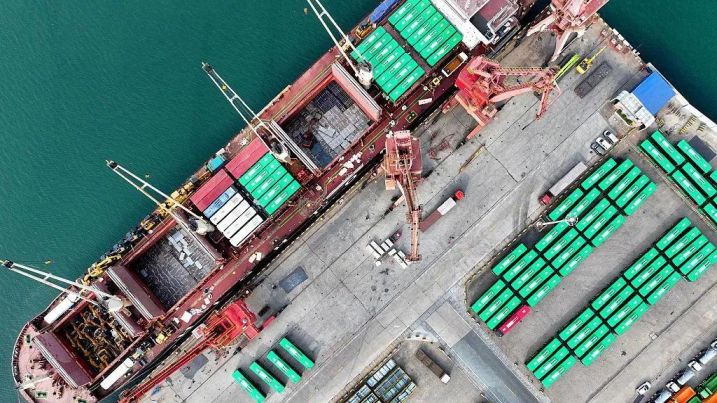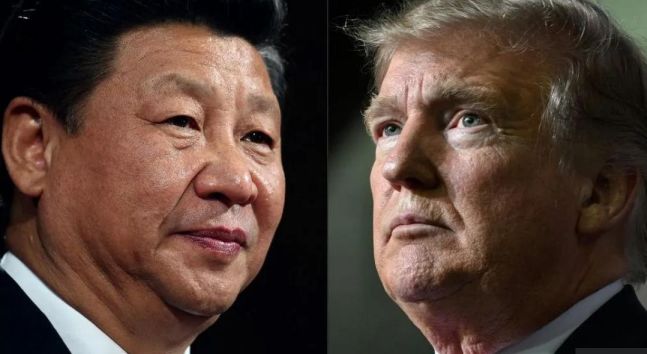By Eric Vandenbroeck and co-workers
Trump Tariffs Effect
China has called for
the world to unite against Trump's tariffs as the country's exporters reel from
crippling new US levies that have risen to 104%.
"Global unity
can triumph over trade tyranny," declared an editorial in the state-run
newspaper China Daily, noting Beijing's collaborations with Japan, South Korea,
and other Asian economies. A separate piece called for the European Union to work
with it to "uphold free trade and multilateralism".
Beijing "firmly
opposes and will never accept such hegemonic and bullying practices,"
foreign ministry spokesperson Lin Jian told reporters on Wednesday.
The tariffs come at a
difficult time for China's sluggish economy: Domestic consumption remains weak,
and exports are still a major driver of growth.
The sweeping nature
of Trump's tariffs has also left Chinese businesses scrambling to adjust their
supply chains - with most countries affected, firms say it's hard to find a way
out of this uncertainty.
The tariffs will
shrink "already razor-thin profit margins", said the owner of a
Chinese business that handles cross-border logistics for e-commerce, as well as
air and sea freight. He did not wish to share his name.
"Higher tariffs
raise costs for freight forwarders like us, as well as for factories,
companies, and sellers. It just means everyone earns less."
Any tariff upwards of
35% will wipe out all the profits that Chinese businesses make when exporting
to the US or South East Asia, said Dan Wang from the Eurasia Group consultancy.
"Growth is going
to be much lower since exports contributed to 20% to 50% of growth since the
Covid pandemic," she added.
The Chinese
government has not announced retaliatory measures but Beijing is reportedly
considering banning Hollywood films and suspending fentanyl cooperation with
the US, according to Chinese blogger Liu Hong, who is a senior editor at
state-run Xinhua news.
But that would offer
little comfort to firms like Fuling, a firm that sells disposable tableware to
US fast food restaurants like McDonald's and Wendy's, said the additional
tariffs will "significantly impact" its business. It noted that
nearly two-thirds of the company's revenue in 2023 and the first half of last
year came from the US.
To mitigate the
impact of tariffs, Fuling, which is headquartered in China's Zhejiang province,
started a new factory in Indonesia late last year.
But Trump's new
tariffs have introduced more uncertainty for Chinese exports from Indonesia are
now subject to a 32% levy, the company said in a corporate filing.

Some Chinese companies say the tariffs deal a
"fatal blow" to their already razor-thin margins
Indonesia was hit
along with much of the world in President Trump's announcement of expansive tariffs last week, which he claimed would allow the US economy to
flourish.
But economists have
warned of a US and global recession. The tariffs have also shaken global
markets and drawn criticism from billionaire CEOs, including Trump's ally Elon
Musk.
Trump's import taxes
include a 10% baseline tariff on almost all imports to the US and higher custom
tariffs for what he calls the "worst offenders". These include
Cambodia (49%), Vietnam (46%), and Thailand (36%), developing economies that
have benefited from strong exports.
After Beijing
announced tit-for-tat tariffs, Trump raised the levies on Chinese imports, more
than doubling them to 104%.
The owner of the
logistics firm told the BBC he is holding out hope that China will be able to
negotiate away some of these taxes: "Only when a final decision is made
can we plan our next steps."
While China has left
the door open for talks, Trump has not spoken to Chinese leader Xi Jinping
since returning to the White House.
Such broad, sweeping
tariffs will cause more harm than good, the American Chamber of Commerce in
China said in a note to its member companies on Wednesday.
"This level of
upheaval is unprecedented, and it remains unclear how the current measures will
benefit consumers in either nation or the broader economy," read the note
signed by Chair Alvin Liu and President Michael Hart.

Trump is yet to speak to Xi since returning to the
White House
Some analysts believe
the levies will force China to restructure its economy and rely heavily on
domestic consumption, which it has been struggling to boost.
Otherwise, the
tariffs will not be sustainable for China in the longer term, Tim Waterer from
brokerage KCM Trade said.
"The tariffs are
aimed at suppressing China," said the manager of a Chinese freight
company, who asked to remain anonymous.
He added that many of
the Southeast Asian countries that have been hit with steep tariffs are
"exactly where many Chinese businesses have relocated", such as
Vietnam and Cambodia.
The Tianjin-based
company plans to negotiate with some of its American clients to share the
burden of the tariffs. "Every case is different, but overall, the impact
has been quite substantial," he said.
Another freight
company manager, Wu Changchun, whose firm mainly operates on shipping routes
between China and Cambodia, said he is already seeing a fall in freight volume.
Several construction
projects in Cambodia have also come to a halt after Trump's tariffs
announcement, he said.
"If the tariffs
were at 10% or 20%, businesses might still be able to absorb the cost by
optimizing supply chains, cutting margins, and sharing the burden. Trade
could still go on... [But at 104%] that's no longer something trade-offs can
fix," said Wu, a general manager at Maritima Maruba.
"That's full-on
decoupling. Trade would basically come to a standstill."
For updates click hompage here